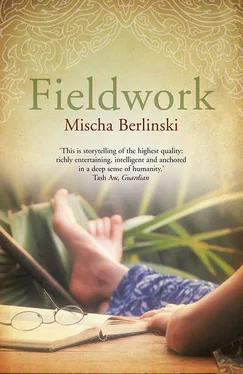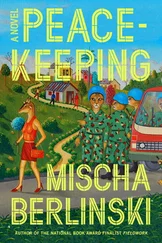hot season and the rain in the monsoon by a high aluminum roof from which hung a bank of spinning ceiling fans. A hardwood patio overlooked the lethargic brown river, and on the far side of the river, there was an undeveloped lot overtaken by bamboo, palms, and banana trees, where a flock of Chinese cranes nested in the cool season. At night, Noi lit the restaurant with a hundred candles, which reflected on the muddy water. Noi's Place was the way we imagined that all of Chiang Mai would be when we first came.
The waitresses had just finished lighting the last of the candles when Rachel arrived, a little after sundown. The front of her white cotton dress was flecked with blood, and she was scowling.
"Little fucker had a nosebleed," Rachel said, before I could say anything.
"A nosebleed?"
"Yeah, a nosebleed. Nat kicked some big kid in the shins, got punched in the nose, saw the blood, and freaked. Two seconds later, the little creep is crying his eyes out and rubbing his snotty, bloody nose all over me. The kid thought he was going to die. Naturally, the whole school was locked up, I couldn't even get a towel, blood everywhere."
All year long, Rachel had come home from school complaining about Nat. We had a running debate over whether Nat was just a little immature for a six-year-old, as I grandly maintained, or whether Nat was plumb stupid, as Rachel argued. "You know, stupid people were once stupid kids," she said.
"Was Nat okay in the end?"
" Of course he was okay in the end. The little weirdo has a nosebleed once a week. Kids get nosebleeds all the time. Morris picks his nose too much and gets a nosebleed, he raises his hand, says ‘Miss Rachel, I go bathroom now, okay?' gets himself some toilet paper, and puts his head back. But every time Nat gets a nosebleed, the freakazoid thinks he's dying and starts howling."
I sympathized with Rachel on her day, then we sat in silence for a while, listening to the radio. You will find it explicated nowhere in the extensive anthropological literature dedicated to the Siamese people, but there is something about the pop music of the early 1980s which is particularly attractive to the Thai: that spring, the theme song from the long-forgotten film Arthur was playing on every radio in every bar, in rotation with the Bee Gee's greatest hits. "If you get caught between the moon and New York City," the voice on the radio sang, "The best that you can do — the best that you can do — is fall in love." So true.
"They want to know if I'm coming back next year at school," Rachel said.
"What did you tell them?"
"I told them I'd think about it and let them know. I'm not sure I can take another year of first grade."
"You don't have to teach first grade. I mean, couldn't you teach second grade? Or third grade, even?"
"I'm not sure I want to teach another year of anything in Thailand."
"I thought you liked the first grade."
"I want us to have a real life," Rachel said, in precisely the same tone she used when Nat threw an eraser at Morris. "I don't want to end up like them . I don't want us to end up one of those people who stay here so long they discover they can't go anywhere else."
We'd had variants on this conversation since coming home from Pak Nai. When I had told Rachel about Laura Walker and her lifelong desire for a comfortable home, Rachel had empathized profoundly. "Poor woman," Rachel said. Rachel was sure that she did not want to stay in Thailand forever; and she wondered how we would cope when we returned to the States. Now she began to wonder, as my dinner-table conversation came to consist of little but dead missionaries and anthropologists, whether we shared the same goals at all. Before I met Martiya and fell in with the Walkers, I thought we did. I hadn't imagined staying much longer in Thailand.
Having spent the early morning in language study and counting, as the day grew stickier, Martiya would bathe herself and wash her clothes. This was a complicated business. Dyalo villages, Martiya learned, were built at altitude under a spring; this was the custom, not to do so would anger the spirits. The spring was not in the village itself but considerably higher on the mountain; and the villagers had constructed an elaborate and quite beautiful set of bamboo ramps and viaducts which conducted water down from the spring into what might be considered the village commons, the large area in front of the communal cooking hut. From there, water was ported to each household either in splashing plastic buckets (a recent innovation from the lowland plains) or in hollow bamboo tubes. The simple act of carrying water from one place to another substantially occupied the Dyalo day. Martiya's hut was on the far side of the ridge from the water source, so every morning Martiya would need to lug the heavy bucket up the hill, past the racist dog whose mad barking, she was sure, was the expression of a deep hatred of topo'uma people, and then down, before dousing herself in the private bamboo-enclosed bathing area behind the house.
When Martiya had finished bathing, her daily battle with her hair began. The effects of extreme humidity on long curly hair — this was another thing that had not been properly discussed in Martiya's graduate seminars, and as she stood dripping after her morning bath, she often felt it a subject of far greater interest to the working anthropologist such as herself than anything that gaseous, close-cropped windbag Margaret Mead had ever written. Martiya's hair had always been voluminous, but now, in the mountains, her head became a wild, savage place. Martiya considered cutting her hair very short, until advised that in a Dyalo village short hair was worn only by women who had lost their young children; the loss of young children was inevitably a sign of spiritual pollution; and such pollution would bar her from entering most of the village's households. She was stuck with the hair. She tried tying her hair back, rubbing it with oil, wearing a kerchief. Nothing worked, certainly not the shampoo the Dyalo made from leech limes and sesame: that stuff, which rendered Dyalo hair long, lithe, and supple, just made Martiya's hair sticky and attract bugs. Foolishly, Martiya had come into the mountains with only six barrettes. Four had disappeared — Martiya suspected the fourteen-year-old girl. The remaining two barrettes that restrained the dark chaos of her hair were all that kept Martiya from a nice career in sociology. She pulled back her long hair, bound it up and out of her face, and went to lunch.
Lunch was the main meal of the day in a Dyalo village; and to Martiya's profound relief, breakfast aside, the Dyalo ate well. The stories she had heard! She had expected rancid meats, a few stringy vegetables, bowls of insect-infested rice. Preparing for such an unfortunate eventuality, she and Vinai had lugged up into the hills a hundred packets of instant noodles. The noodles lay unopened in her pack. The long history of the Dyalo isn't well known, but it is generally believed that they drifted, as a people, down from Tibet, through Yunnan Province, over to Burma, then made a left turn into Thailand. From all these countries they acquired recipes, allowing them an exceptionally diverse kitchen; and, indeed, even as those Lahu monkeys were widely known in the hills for their stupidity, the Hmong for their clever avarice, and the Akha for their cruelty, the Dyalo were widely known for their cuisine. In the center of the village, there was a hut longer and taller than the others. This was the communal kitchen. The Dyalo did not eat communally, carrying the prepared food back to their own houses, nor did they farm communally, each Dyalo household reaping only what it sowed, but they shared one large cooking space. The hut was long with a high ceiling and a packed earth floor, with a half dozen small cooking fires. Rice was the staple of the Dyalo diet, and was served at every meal; but the Dyalo seemed to know everything that was edible in the hills, and it all ended up sooner or later in the wok or stew pot: a dozen types of mushrooms, weird spices, pungent roots, strange flowers, delicate game birds, even repulsive but given half a chance compellingly crunchy deep-fried termites. Dyalo rice — plain old white rice— was so delicious that Martiya could eat a bowl by itself without any sauce at all: it was long-grained and earthy, and the difference between Dyalo mountain rice and the rice that Martiya was used to back home was pretty much the difference between Wonder Bread and hot bread fresh from the bakery oven. Strange pickled beets and at least two dozen fermented sauces; wild honey perfumed with orchids and jasmine which the children gathered at substantial personal risk from apiaries in the jungle; huge feathery omelettes in a chili and coriander sauce; on cold rainy nights, yellow Burmese curries with thick, floury potatoes, or three types of mushrooms soaked overnight in rice vinegar. Martiya was surprised to find herself gaining weight in Dan Loi, and she swore to herself that if she took home nothing else from the village, she'd become a competent Dyalo cook, a skill that she imagined might enliven otherwise dull dinner parties in later life.
Читать дальше












